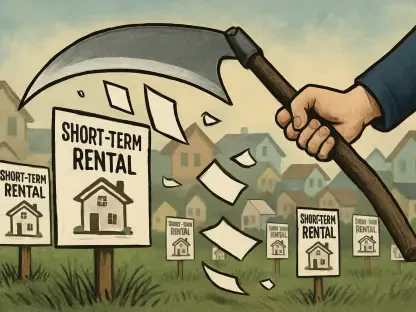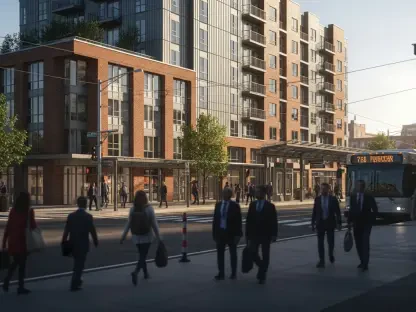Luca Calaraili is an expert in Construction, with extensive knowledge in design and architecture. He is also passionate about exploring technology applications and tools that drive innovation within the industry. In this interview, we will discuss the PRHB’s response to the Eaton Fire, the proposal made by the Pasadena Housing Providers (PHP), and how these actions impact the tenants.
Can you provide a brief overview of what the Eaton Fire was and when it happened?
The Eaton Fire was a devastating incident that occurred earlier this year. It led to significant damage to residential properties and displaced many tenants. The impact on the community was profound, leading to immediate discussions on how to address the urgent needs of those affected.
How has the PRHB generally responded to the needs of tenants affected by the Eaton Fire?
The PRHB has made several efforts to address the needs of the tenants, but their focus has been more on long-term solutions rather than the immediate and short-term housing needs of those displaced by the fire. This has led to some criticism, as many affected tenants require short-term housing solutions.
Why do you believe that the PRHB has failed to address the needs of tenants seeking short-term housing?
The PRHB appears to be more concerned with longer-term stability and protections for tenants, which, while important, neglects the immediate and urgent needs of those who require short-term accommodations. There’s a gap in their approach to providing immediate relief for tenants who need temporary housing for a few months.
What are some of the specific reasons tenants might need short-term housing?
Tenants might need short-term housing for several reasons. Some may want a lease that lasts just a few months to allow their children to finish the school term, while others might have insurance that only covers a few months of rent, necessitating a temporary solution until they can secure permanent housing.
How can hotels be a less suitable option for larger families compared to other forms of temporary housing?
Hotels often provide limited space and lack the amenities necessary for daily life, which can be particularly challenging for larger families. This setup can make it difficult for families to maintain a sense of normalcy, especially when trying to adhere to regular routines like schooling and meal preparation.
Could you describe the proposal made by the Pasadena Housing Providers (PHP) to the city council and PRHB?
The PHP proposed that their members could offer short-term housing to tenants affected by the fire at fair rental rates. They suggested waiving credit requirements and reducing security deposits to facilitate this. Additionally, they committed to avoiding price gouging and asked to be relieved of certain requirements like relocation fees.
What are some of the specific terms proposed by the PHP to assist tenants affected by the fire?
Specific terms included offering short-term leases at fair rental rates, waiving credit checks, and reducing security deposits. They also emphasized the importance of adhering to price gouging laws to protect tenants from unfair rent increases during this vulnerable period.
How does the PHP proposal address the issue of price gouging?
The PHP proposal includes strict adherence to price gouging laws, ensuring that rents remain within legal limits. This safeguard is intended to protect tenants from exploitative increases in rent during the emergency situation caused by the fire.
In what ways does the PHP proposal attempt to protect tenants while addressing landlord concerns?
The PHP proposal balances tenant protections with landlord concerns by offering fair rental rates and relaxing certain requirements for tenants, such as waiving credit checks and reducing security deposits. In return, landlords are given relief from some obligations like relocation fees, making the arrangement more feasible for them.
Why do you think the PRHB ignored the PHP proposal in their recent discussion?
It’s possible that the PRHB did not see the PHP proposal as aligning with their broader, long-term goals. They might also have concerns about setting a precedent that could be perceived as favoring landlords over tenants, despite the PHP’s balanced approach.
Can you elaborate on the PRHB’s general discussion points, particularly regarding “greedy landlords” and “tenant protections”?
The PRHB’s discussions often revolve around protecting tenants from exploitation, which includes accusations of landlords being opportunistic by raising rents unfairly. They emphasize the need for robust tenant protections to prevent evictions and price gouging, although this can sometimes result in overlooking short-term housing needs.
How would the PHP proposal benefit tenants compared to the current solutions proposed by the PRHB?
The PHP proposal offers more immediate, practical solutions for those impacted by the Eaton Fire. By providing short-term leases with reduced barriers to entry, it addresses the immediate housing needs of tenants more effectively than the longer-term measures currently being proposed by the PRHB.
What are the current price gouging laws in effect during the state of emergency, and how do they protect tenants?
During a state of emergency, price gouging laws restrict the amount by which landlords can increase rents, often capping any increases at a small percentage above pre-emergency rates. These laws are designed to prevent landlords from taking advantage of the increased demand for housing during crises.
How might extending protections to hotels impact tenants staying beyond thirty days?
Extending tenant protections to hotels for stays beyond thirty days could complicate matters by imposing permanent tenancy rules on temporary accommodations. This could discourage hotels from offering long-term stays, potentially limiting options for tenants needing temporary housing.
Do you believe extending these protections to hotels could limit tenant protections? If so, how?
Yes, extending permanent tenancy protections to hotels could inadvertently limit tenant options. Hotels might avoid offering extended stays to bypass complex tenancy rules, thus reducing the availability of temporary housing during emergencies.
Why do you feel the PRHB has not prioritized short-term housing needs for affected tenants?
The PRHB seems to be more focused on long-term housing stability and tenant protections, possibly overlooking the immediate needs of those who require short-term solutions. Their current policies might not be flexible enough to address the urgent and temporary housing needs of tenants affected by the Eaton Fire.
What are your expectations for the upcoming PRHB special meeting on February 27, 2005?
I hope that the PRHB will reconsider the PHP proposal and discuss more comprehensive solutions that include short-term housing needs. It’s essential that they address this gap to provide immediate relief to all tenants affected by the fire.
What steps would you recommend the PRHB take to better address the needs of tenants needing short-term housing following the Eaton Fire?
The PRHB should consider integrating proposals like the PHP’s that offer practical, short-term solutions. They should also ensure that any regulations provide flexibility to accommodate the varied and immediate needs of displaced tenants. Engaging with both tenants and landlords to find balanced, effective solutions will be crucial in addressing this crisis comprehensively.









